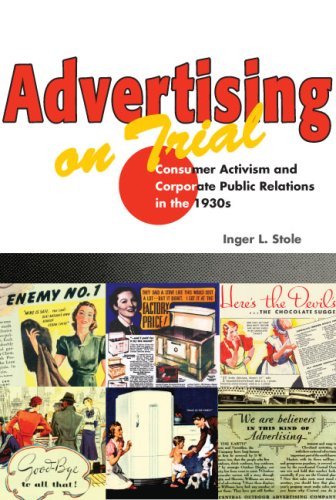No Space for Reality Ads
Submitted by Bob Burton on


Submitted by Bob Burton on

Submitted by Bob Burton on
The European Commission "may be the victim of a carefully planned attack by representatives of the alcohol industry" to derail the adoption of a strategy to reduce the health effects of alcohol, warns Martin McKee, professor of European public health from the London School of Hygiene and Tropical Medicine.
Recently a new lobby group, the [[National Association of Broadcast Communicators]] (NABC), was launched to try to convince federal regulators, media policy wonks and the general public that they shouldn't worry about television stations airing undisclosed [[video news releases]] (VNRs). The NABC and their allies at the [[Public Relations Society of America]] and the [[Radio-Television News Directors Association]] went even further, wrapping the covert broadcast of corporate- and government-funded [[fake news]] segments in the U.S. flag.
Ever the optimist, I'm looking forward to the day when these groups have considered the issue more closely and carefully, and have come to appreciate the important role that news -- especially that broadcast over the public airwaves to a mass audience -- plays in a democracy. The following is the statement that NABC might well issue, on that sunny day. (Satire alert!)
VNR Producers Apologize for News Audiences Being Misled
We are sorry. Very sorry. For many years we have been very well paid to produce thousands of video news releases (VNRs) that have been circulated among and promoted to television stations far and wide -- many within the United States, others around the world. Some of these VNRs featured our PR staff posing on screen as "reporters." For every VNR, we assumed the role of reporters, with a twist -- only "reporting" what complemented our clients' marketing, PR or policy agendas.
We knew all along that television stations aired many of these VNRs in their entirety, without disclosing to viewers that the segment actually came from a PR firm. Sometimes TV stations' local reporters re-voiced the script we provided. Sometimes stations spliced and diced our video, but they largely followed the sponsored storyline that they had been fed. However, there were times when our plans backfired and stations used our VNRs to criticize our clients. (You really don't want to know how we explained that away!)
And you, the television viewers, were none the wiser that you were watching fake news.
Decades ago, when a few companies first started producing VNRs, there was little discussion about the ethical implications of their use. We saw VNRs as just one of many PR tricks to help our clients. However, in the last few years there has been significant public debate over the ethics of what has become a substantial sector of the PR industry. There have been petitions, reports, numerous scathing news stories, legislative amendments, and now an investigation by the U.S. [[Federal Communications Commission]].
Under such conditions, the normal response of industry is to hunker down and try and defend the indefensible. We have decided to be smarter and better than that.
We decided that this crisis provides an opportunity for us to reflect on what we have done and where we go from here. We now realize that the wholesale deception of TV news viewers by undisclosed VNRs was wrong and constituted a grievous breach of ethical standards, not to mention TV stations' license agreements. We would like to take this opportunity to offer our heartfelt thanks to the Center for Media and Democracy and Free Press, for raising the issue publicly and helping us realize the error of our ways.
We recognize that this apology is just the first small step in rectifying the damage we have done to the quality and credibility of television news programming. We have also decided to spell out our mistakes, in the hopes that our current and future colleagues will learn from them.
Submitted by Anne Landman on
The September 2006 issue of a Denver area LGBT magazine, MetroMode, carries a curious full-page ad titled "Busting the Myths of Smoke-Free Colorado" that urges readers to protest Colorado's Clean Indoor Air Act, the law that ended smoking in most workplaces (including bars and restaurants) as of July 1, 2006.
Submitted by Jonathan Rosenblum on
The sport of baseball got its reputation as a "Field of Dreams," in part, because the game is played outside of time. There is a nominal starting time, but no game clock. Once endorsement deals became as fashionable as designer steroids, everything else went up for sale. Last week, reports Richard Sandomir, the Chicago White Sox literally sold their starting time for $500,000 per year, so that convenience store chain 7-Eleven could get a little more PR. For the next three seasons, the approximately 50 night games on Chicago's South Side will be scheduled to begin at exactly 7:11 p.m.
Submitted by Bob Burton on
A coalition of European health groups, including the International Society of Drug Bulletins and the Medicines in Europe Forum, is alarmed at a renewed campaign by the drug industry to lift the ban on direct-to-consumer advertising in Europe.
Submitted by Diane Farsetta on
"The Army spends more than $200 million annually on marketing -- the biggest ad contract in the federal government," notes Advertising Age. Ten months after winning the U.S. Army's main advertising contract, the McCann Worldgroup firm announced the theme of its first campaign: strength. "There's strong, and then there's Army strong," explained a video from the firm. "There is nothing on this green earth that is stronger than the U.S.
 From the interviewer:
From the interviewer:
Submitted by Judith Siers-Poisson on
 On September 5, 2006, President Bush nominated Mary Peters as Secretary of the Department of Transportation. PR firms should be thrilled.
On September 5, 2006, President Bush nominated Mary Peters as Secretary of the Department of Transportation. PR firms should be thrilled.
Submitted by Diane Farsetta on
Wal-Mart's new television ads promote "its health care plans, charitable contributions and positive impact on the American economy" in "unusually detailed terms." In one ad, the narrator says, "Our low prices save the average working family $2,300 a year. Which buys a lot of things -- and a whole lot of freedom." Wal-Mart's Robert McAdam stated, "These ads are more direct than anything we have done before." The New York Times' Michael Barbaro compares them to political campaign ads.
Center for Media and Democracy (CMD)
520 University Ave, Ste 305 • Madison, WI 53703 • (608) 260-9713
CMD is a 501(c)(3) tax-exempt non-profit.
© 1993-2025